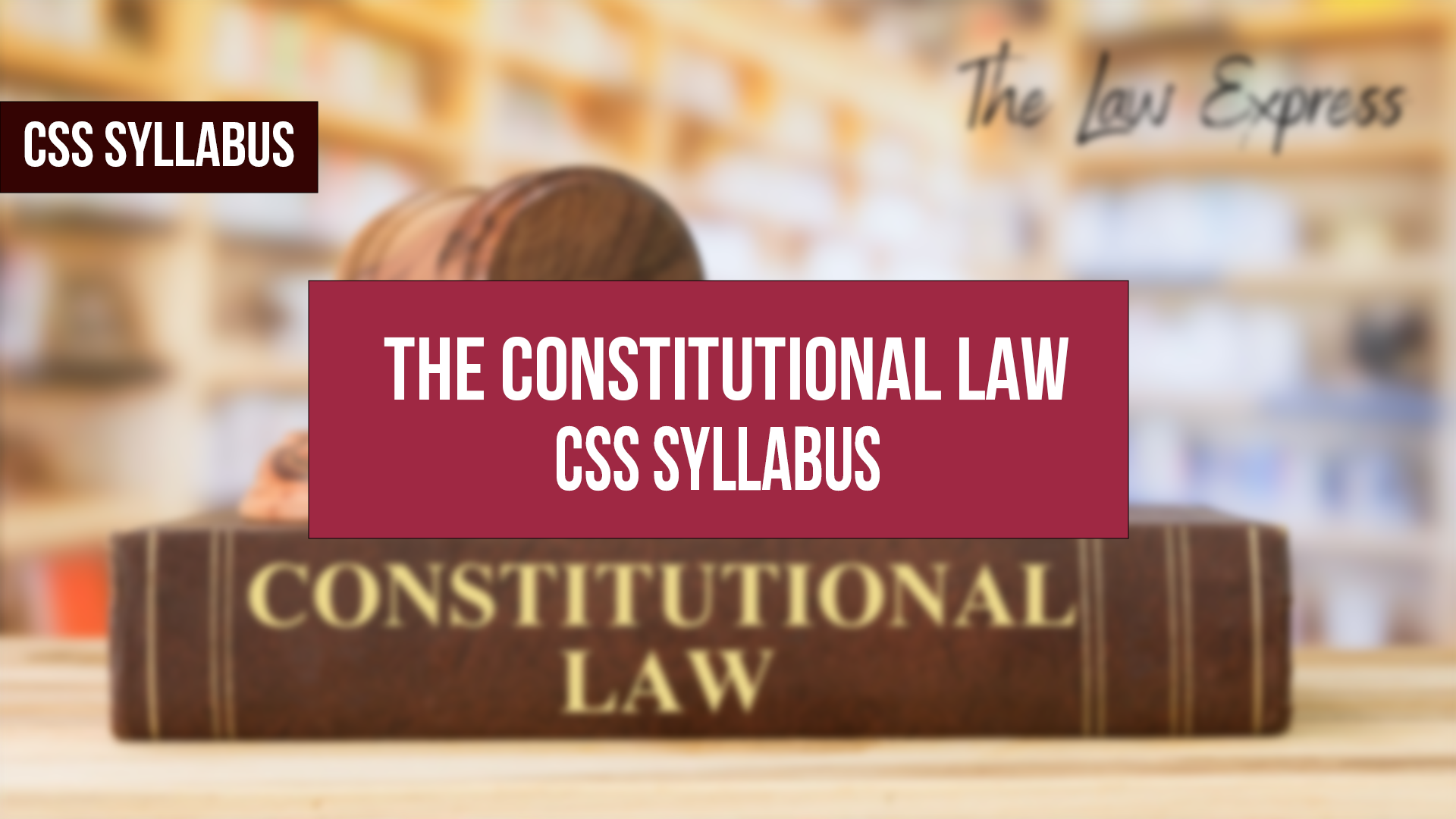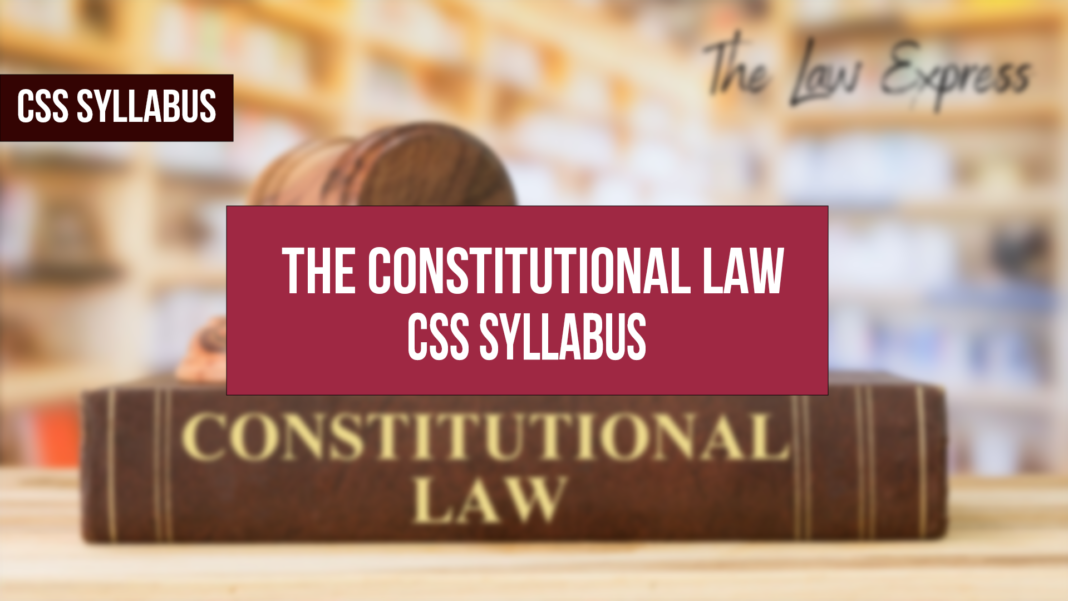Constitutional Law CSS syllabus is a crucial component for those aiming to excel in competitive exams, particularly the CSS exam. In this comprehensive guide, we’ll delve into the nuances of this syllabus, exploring its historical context and understanding its significance in shaping successful careers.

Understanding Constitutional Law CSS Syllabus
Historical Context
The CSS syllabus has a rich historical background, evolving over time to meet the dynamic needs of society. Understanding its roots provides aspirants with a contextual foundation for their studies.
Evolution of the CSS Syllabus
The CSS syllabus is not static; it adapts to changes in legal landscapes and societal demands. A closer look at its evolution sheds light on the subjects’ relevancy and importance.
Key Components of CSS Syllabus
Core Subjects
CSS encompasses a range of core subjects, each playing a vital role in shaping a candidate’s knowledge base. Constitutional law, as a significant part, deserves special attention for its depth and implications.
Constitutional Law Specifics
A detailed breakdown of what constitutional law entails within the CSS syllabus gives aspirants a roadmap for effective preparation.
CONSTITUTIONAL LAW css syllabus
I. Definition and Scope of Constitutional Law, Basic Constitutional Concepts
(Constitutional Conventions, Rule of Law, Due Process), Constitutional Structures
(Parliamentary, Presidential, Separation of Powers), Judiciary (Independence of
Judiciary, Judicial Review, Theories of Constitutional Interpretation) Fundamental
Human and Political Rights and Civil Liberties (freedom of speech, association,
assembly, movement and Right to Counsel, life, property, religion, privacy, self
incrimination, double jeopardy).
II. Principles of Constitutional Law with special reference to United Kingdom, United
States of America, France, Russia, China, Pakistan, India and Turkey.
III. Constitutional History of Pakistan: Principles of Constitutional Law of Pakistan,
Salient feature of the Government of India Act, 1935, Indian Independence Act 1947,
Objectives Resolution 1949, Constitutions of 1956, 1962 and 1973, Abrogation and
Suspension of the Constitutions and the Martial Laws, Legal Framework Order,
1970, The PCO of 1981, The RCO of 1985, The LFO-2002, Amendments in the 1973
Constitution.
IV. Legal Development:
Maulvi Tamizuddin Khan v. Federation of Pakistan PLD 1955 Sindh 96.
Federation of Pakistan vs. Maulvi Tamizuddin Khan, PLD 1955 FC 240
Reference by the Governor-General PLD 1955 FC 435
State v. Dosso PLD 1958 SC 533.
Usif Patel v. Crown PLD 1955 FC 387
Begum Nusrat Bhutto v. Chief of the Army Staff PLD 1977 SC 657
Hakim Khan v. Government of Pakistan PLD 1992 SC 595
Nawaz Sharif v. President of Pakistan PLD 1993 SC 473
Benazir Bhutto v. the President of Pakistan PLD 1992 SC 492
Khawaja Muhammad Sharif, PLD 1988 Lah. 725
Federation of Pakistan v. Haji Saifullah Khan PLD 1989 SC 166
Khawaja Ahmad Tariq Rahim PLD 1992 SC 646
Benazir Bhutto v. President of Pakistan, PLD 1998 SC 388
Asma Jilani v. Government of the Punjab PLD 1972 SC 139
State v. Zia ur Rehman PLD 1973 SC 49
Mahmood Khan Achakzai v. Fed. of Pakistan PLD 1997 SC 426
Zafar Ali Shah v. General Pervez Musharraf, PLD 2000 SC 869.
Sindh High Court Association v. Federation of Pakistan, PLD 2009 SC 879.
Significance in Competitive Exams
Role in CSS Exam
Constitutional law is not just a segment of the CSS exam; it plays a pivotal role in determining a candidate’s success. Grasping its significance is key to formulating a winning strategy.
Impact on Career
Success in the CSS exam opens doors to prestigious career opportunities. We explore how a solid grasp of constitutional law enhances a candidate’s career trajectory.
Curriculum Overview
In-depth Analysis
A meticulous analysis of the constitutional law curriculum offers valuable insights into the depth and breadth of the subject matter.
Notable Changes Over Time
The CSS syllabus undergoes periodic updates. Aspirants benefit from staying informed about these changes, ensuring they align their studies with the latest requirements.
Tips for Mastering Constitutional Law CSS Syllabus
Effective Study Strategies
Navigating the constitutional law syllabus demands effective study strategies. Proven approaches and tips are shared to empower aspirants in their preparation journey.
Resources and References
Identifying the right resources and references is a game-changer. We highlight key materials to aid aspirants in their study sessions.
FAQs – Introduction to CSS Syllabus
What is CSS?
CSS stands for Central Superior Services, a competitive exam in Pakistan.
Why is Constitutional Law Important in CSS Syllabus?
Constitutional law is vital as it forms the backbone of legal understanding, a prerequisite for administrative and bureaucratic roles.
FAQs – Preparation Tips
How to Effectively Study CSS Syllabus?
Effective study involves a balance of thorough reading, practice tests, and revisiting key concepts.
Recommended Resources
Reliable resources include official publications, legal journals, and preparatory books tailored for CSS exams.

Editor Timesglo
Editor can be reached at editortimesglo@gmail.com






